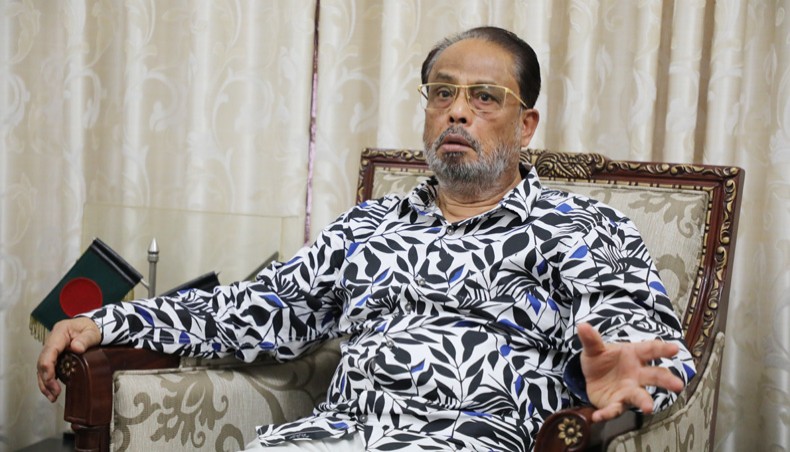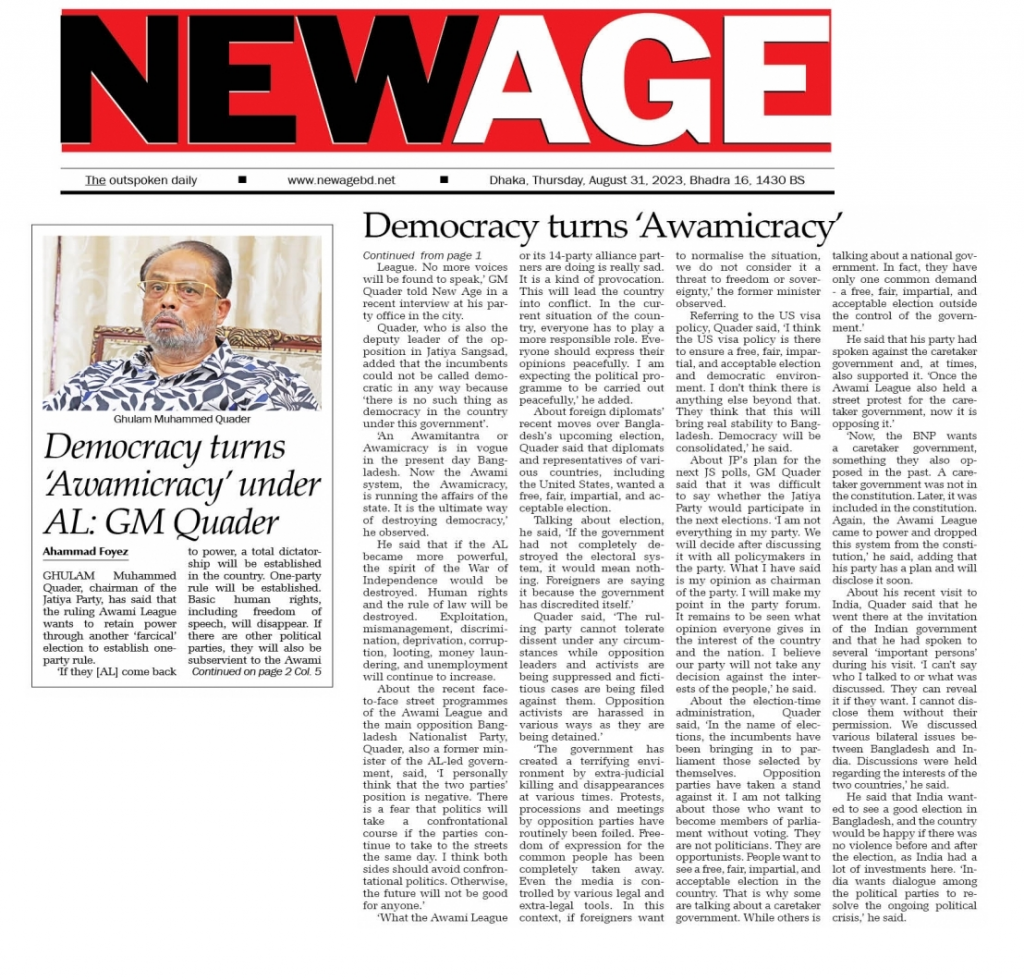
Ghulam Muhammed Quader, chairman of the Jatiya Party, has said that the ruling Awami League wants to retain power through another ‘farcical’ election to establish one-party rule.
‘If they [AL] come back to power, a total dictatorship will be established in the country. One-party rule will be established. Basic human rights, including freedom of speech, will disappear. If there are other political parties, they will also be subservient to the Awami League. No more voices will be found to speak,’ GM Quader told New Age in a recent interview at his party office in the city.
Quader, who is also the deputy leader of the opposition in Jatiya Sangsad, added that the incumbents could not be called democratic in any way because ‘there is no such thing as democracy in the country under this government’.
‘An Awamitantra or Awamicracy is in vogue in the present day Bangladesh. Now the Awami system, the Awamicracy, is running the affairs of the state. It is the ultimate way of destroying democracy,’ he observed.
He said that if the AL became more powerful, the spirit of the War of Independence would be destroyed. Human rights and the rule of law will be destroyed. Exploitation, mismanagement, discrimination, deprivation, corruption, looting, money laundering, and unemployment will continue to increase.
About the recent face-to-face street programmes of the Awami League and the main opposition Bangladesh Nationalist Party, Quader, also a former minister of the AL-led government, said, ‘I personally think that the two parties’ position is negative. There is a fear that politics will take a confrontational course if the parties continue to take to the streets the same day. I think both sides should avoid confrontational politics. Otherwise, the future will not be good for anyone.’
‘What the Awami League or its 14-party alliance partners are doing is really sad. It is a kind of provocation. This will lead the country into conflict. In the current situation of the country, everyone has to play a more responsible role. Everyone should express their opinions peacefully. I am expecting the political programme to be carried out peacefully,’ he added.
About foreign diplomats’ recent moves over Bangladesh’s upcoming election, Quader said that diplomats and representatives of various countries, including the United States, wanted a free, fair, impartial, and acceptable election.
Talking about election, he said, ‘If the government had not completely destroyed the electoral system, it would mean nothing. Foreigners are saying it because the government has discredited itself.’
Quader said, ‘The ruling party cannot tolerate dissent under any circumstances while opposition leaders and activists are being suppressed and fictitious cases are being filed against them. Opposition activists are harassed in various ways as they are being detained.’
‘The government has created a terrifying environment by extra-judicial killing and disappearances at various times. Protests, processions and meetings by opposition parties have routinely been foiled. Freedom of expression for the common people has been completely taken away. Even the media is controlled by various legal and extra-legal tools. In this context, if foreigners want to normalise the situation, we do not consider it a threat to freedom or sovereignty,’ the former minister observed.
Referring to the US visa policy, Quader said, ‘I think the US visa policy is there to ensure a free, fair, impartial, and acceptable election and democratic environment. I don’t think there is anything else beyond that. They think that this will bring real stability to Bangladesh. Democracy will be consolidated,’ he said.
About JP’s plan for the next JS polls, GM Quader said that it was difficult to say whether the Jatiya Party would participate in the next elections. ‘I am not everything in my party. We will decide after discussing it with all policymakers in the party. What I have said is my opinion as chairman of the party. I will make my point in the party forum. It remains to be seen what opinion everyone gives in the interest of the country and the nation. I believe our party will not take any decision against the interests of the people,’ he said.
About the election-time administration, Quader said, ‘In the name of elections, the incumbents have been bringing in to parliament those selected by themselves. Opposition parties have taken a stand against it. I am not talking about those who want to become members of parliament without voting. They are not politicians. They are opportunists. People want to see a free, fair, impartial, and acceptable election in the country. That is why some are talking about a caretaker government. While others is talking about a national government. In fact, they have only one common demand – a free, fair, impartial, and acceptable election outside the control of the government.’
He said that his party had spoken against the caretaker government and, at times, also supported it. ‘Once the Awami League also held a street protest for the caretaker government, now it is opposing it.’
‘Now, the BNP wants a caretaker government, something they also opposed in the past. A caretaker government was not in the constitution. Later, it was included in the constitution. Again, the Awami League came to power and dropped this system from the constitution,’ he said, adding that his party has a plan and will disclose it soon.
About his recent visit to India, Quader said that he went there at the invitation of the Indian government and that he had spoken to several ‘important persons’ during his visit. ‘I can’t say who I talked to or what was discussed. They can reveal it if they want. I cannot disclose them without their permission. We discussed various bilateral issues between Bangladesh and India. Discussions were held regarding the interests of the two countries,’ he said.
He said that India wanted to see a good election in Bangladesh, and the country would be happy if there was no violence before and after the election, as India had a lot of investments here. ‘India wants dialogue among the political parties to resolve the ongoing political crisis,’ he said.

